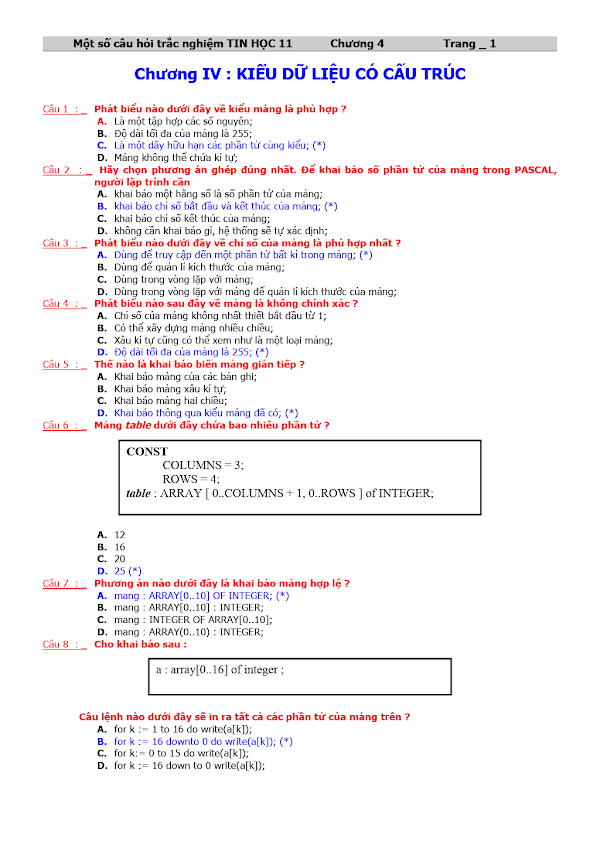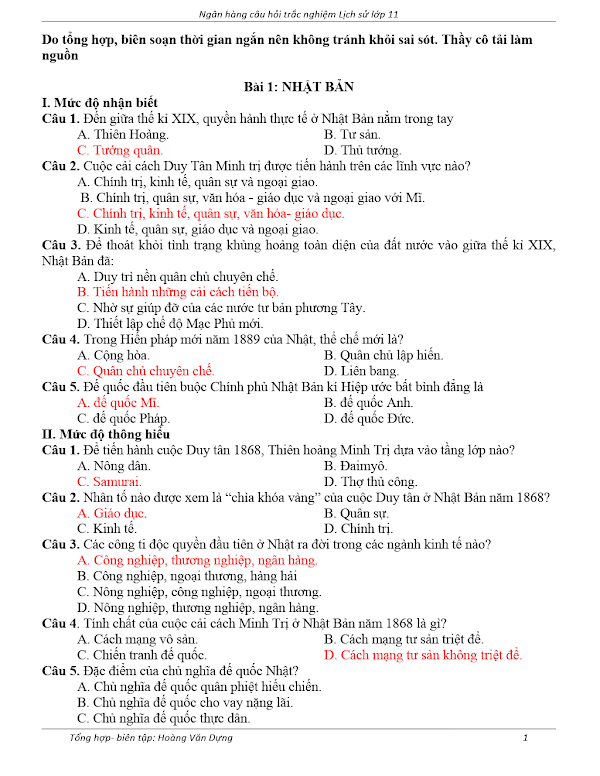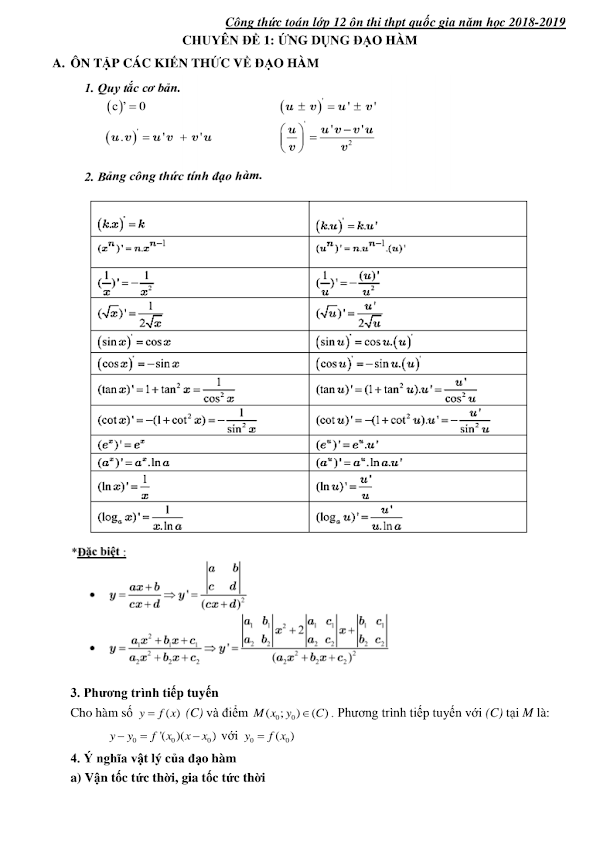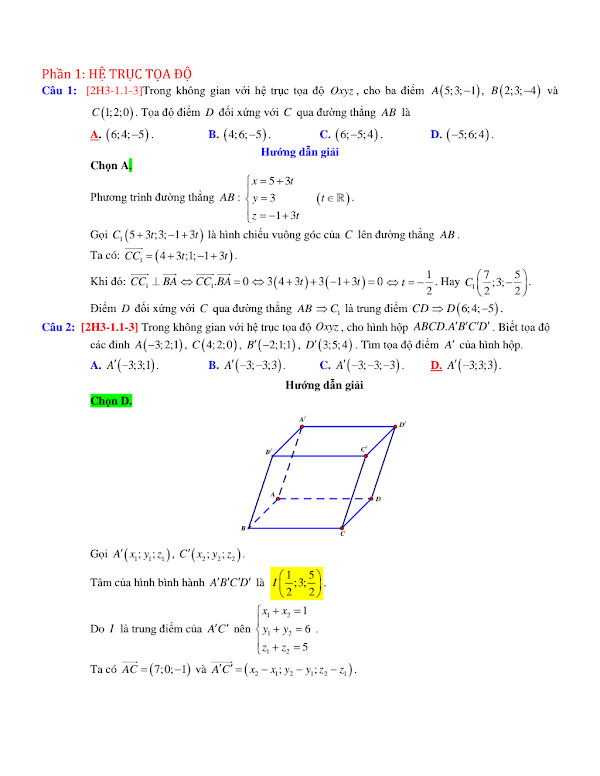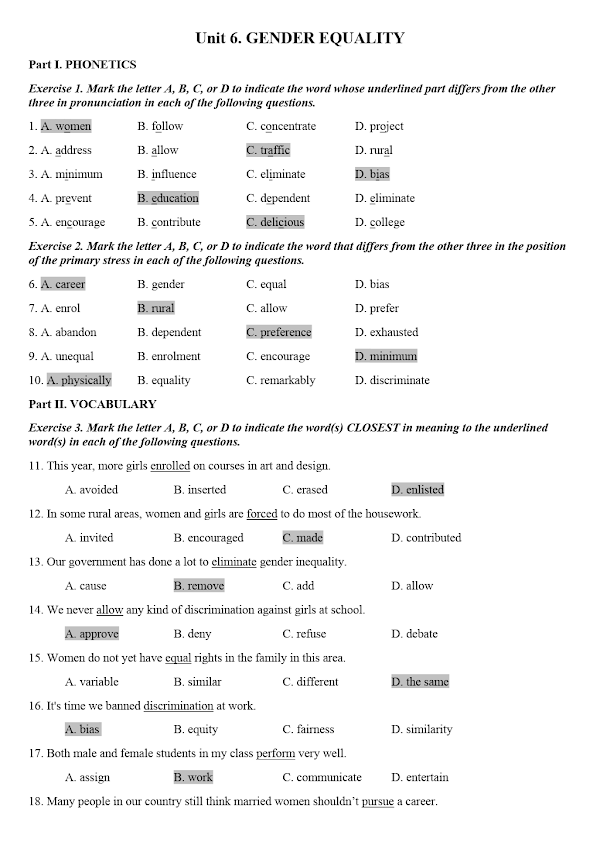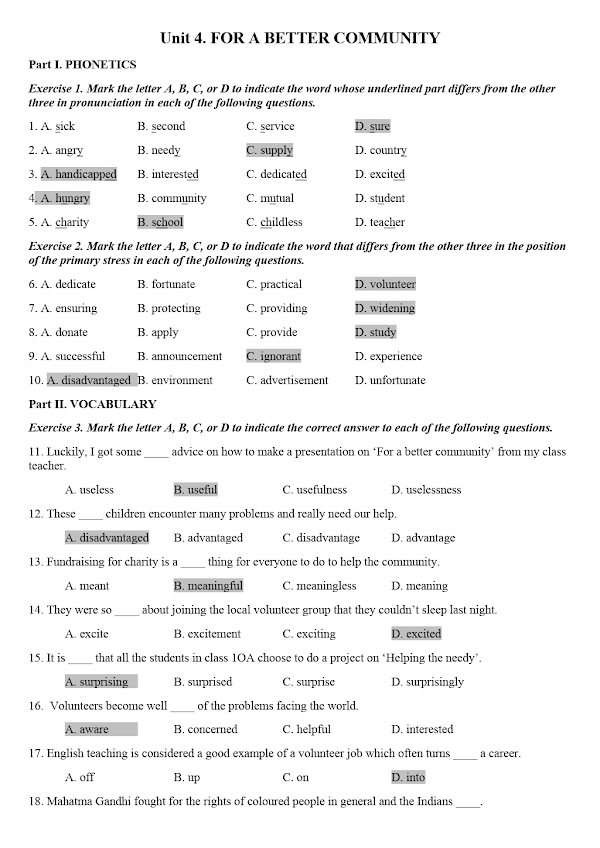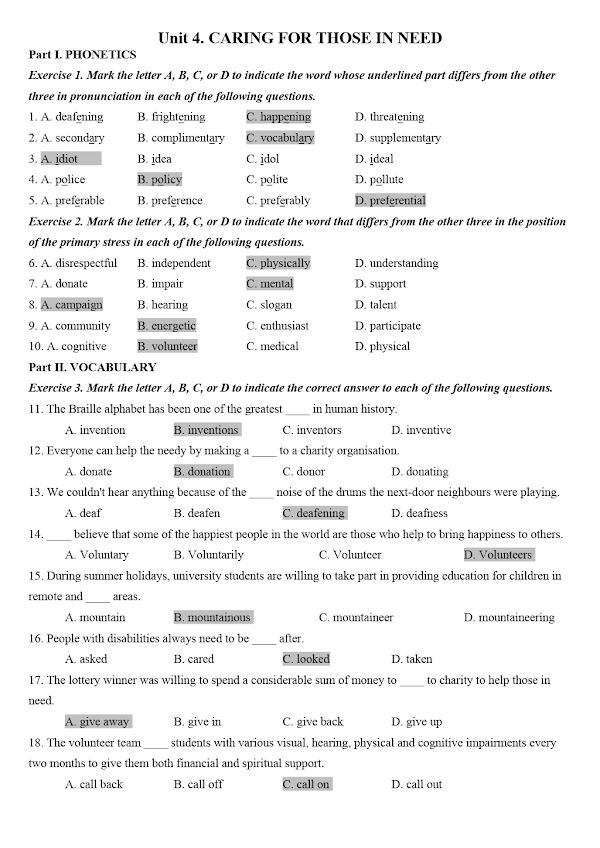Bài tập cuối tuần môn Tiếng Anh lớp 9 - tập 1 (có đáp án)
Chào các bạn học sinh và quý thầy cô, hôm nay LogaVN gửi tới bạn đọc tài liệu "Bài tập cuối tuần môn Tiếng Anh lớp 9 - tập 1 (có đáp án)". Hi vọng sẽ giúp ích cho các bạn học tập và giảng dạy.
BÀI TẬP CUỐI TUẦN
TIẾNG ANh
LỚP 9 – TẬP 1
CÓ ĐÁP ÁN
LỜI NÓI ĐẦU
Các em học sinh thân mến!
Các em đang cầm trên tay một trong những cuốn sách hay và cần thiết trong quá trình học tiếng Anh của mình. Đó là cuốn sách Bài tập cuối tuần tiếng Anh lớp 9 tập 1. Cuốn sách được ra đời với bao công sức của tác giả, giáo viên giàu kinh nghiệm giảng dạy tiếng Anh. Nội dung cuốn sách được chia theo các đơn vị bài học và bám sát chương trình học tập trên lớp của các em. Đây là một tài liệu cực kỳ hữu ích nhằm giúp các em ôn tập, củng cố và nâng cao vốn tiếng Anh của mình.
Trong mỗi đơn vị bài học, chúng tôi đều trình bày đầy đủ các nội dung sau:
- Phần lý thuyết: Tập trung vào trọng tâm ngữ pháp của bài học
- Phần Week 1: Tập trung vào việc thực hành kiến thức ngôn ngữ của các em. Các em sẽ được rèn luyện ngữ âm, từ vựng và ngữ pháp/ mẫu câu trong phần này.
- Phần Week 2: Phần này giúp rèn luyện và hoàn thiện cả 4 kỹ năng giao tiếp: Nghe - Nói - Đọc - Viết tiếng Anh của các em.
Kết hợp với các nội dung trong sách là đĩa CD phát âm chuẩn tiếng Anh của người bản ngữ. Chúng tôi tin rằng CD này sẽ hỗ trợ các em rất nhiều trong quá trình rèn luyện kỹ năng giao tiếp tiếng Anh của mình. Lời cuối cùng, chúng tôi mong muốn được gửi lời cảm ơn chân thành nhất tới độc giả, tới các em học sinh, các bậc phụ huynh và các quý thầy cô đã giúp đỡ chúng tôi rất nhiều trong quá trình biên soạn tài liệu quý báu này. Chúng tôi cũng mong muốn được lắng nghe những ý kiến góp ý chân thành nhất của các bậc phụ huynh và các thầy cô giáo để lần tái bản sau cuốn sách sẽ đầy đủ hơn, ý nghĩa hơn.
Trân trọng!
Tác giả
ĐẠI LỢI
BÀI TẬP CUỐI TUẦN
TIẾNG ANh
LỚP 9 – TẬP 1
CÓ ĐÁP ÁN
NHÀ XUẤT BẢN ĐẠI HỌC QUỐC GIA HÀ NỘI
LỜI NÓI ĐẦU
Các em học sinh thân mến!
Các em đang cầm trên tay một trong những cuốn sách hay và cần thiết trong quá trình học tiếng Anh của mình. Đó là cuốn sách Bài tập cuối tuần tiếng Anh lớp 9 tập 1. Cuốn sách được ra đời với bao công sức của tác giả, giáo viên giàu kinh nghiệm giảng dạy tiếng Anh. Nội dung cuốn sách được chia theo các đơn vị bài học và bám sát chương trình học tập trên lớp của các em. Đây là một tài liệu cực kỳ hữu ích nhằm giúp các em ôn tập, củng cố và nâng cao vốn tiếng Anh của mình.
Trong mỗi đơn vị bài học, chúng tôi đều trình bày đầy đủ các nội dung sau:
- Phần lý thuyết: Tập trung vào trọng tâm ngữ pháp của bài học
- Phần Week 1: Tập trung vào việc thực hành kiến thức ngôn ngữ của các em. Các em sẽ được rèn luyện ngữ âm, từ vựng và ngữ pháp/ mẫu câu trong phần này.
- Phần Week 2: Phần này giúp rèn luyện và hoàn thiện cả 4 kỹ năng giao tiếp: Nghe - Nói - Đọc - Viết tiếng Anh của các em.
Kết hợp với các nội dung trong sách là đĩa CD phát âm chuẩn tiếng Anh của người bản ngữ. Chúng tôi tin rằng CD này sẽ hỗ trợ các em rất nhiều trong quá trình rèn luyện kỹ năng giao tiếp tiếng Anh của mình. Lời cuối cùng, chúng tôi mong muốn được gửi lời cảm ơn chân thành nhất tới độc giả, tới các em học sinh, các bậc phụ huynh và các quý thầy cô đã giúp đỡ chúng tôi rất nhiều trong quá trình biên soạn tài liệu quý báu này. Chúng tôi cũng mong muốn được lắng nghe những ý kiến góp ý chân thành nhất của các bậc phụ huynh và các thầy cô giáo để lần tái bản sau cuốn sách sẽ đầy đủ hơn, ý nghĩa hơn.
Trân trọng!
Tác giả
PAGE \* MERGEFORMAT 6
BÀI TẬP CUỐI TUẦN TIẾNG ANH LỚP 9 – TẬP 1
PAGE \* MERGEFORMAT 5
UNIT 1: LOCAL ENVIRONMENT
Unit
1LOCAL ENVIRONMENT
WEEK 1
A THEORY: LANGUAGE KNOWLEDGE
PRONUNCIATION
Các nguyên tắc cơ bản của việc nhấn trọng âm trong câu như sau:
- Từ thuộc về mặt nội dung (content word): được nhấn trọng âm
Những từ mang nghĩaVí dụVerbplay; love, give, employ, talk, listen, etc.Nountable, book, car, music, desk, etc.Adjectivesmall, big, hot, cold, good, interesting, clever, etc.Adverbloudly, quietly, quickly, loudly, never, etc.Auxiliary verb (negative)isn't, doesn't, don't, can't, aren't, etc.Pronoun demonstrativethis, that, those, these, etc.Wh-questionwhen, why, how, who, which, where, etc.
- Từ thuộc về mặt cấu trúc (empty word): không được nhấn trọng âm
Những từ đúng về mặt cấu trúcVí dụSubject pronounI, you, we, they, he, she, itPrepositionon, at, into, of, about, before, after, etc.Articlea, an, theConnective wordsand, but, because, although, so, however, etc.Modal verbcan, may, might, would, could, should, must, etc‘to be’am, is, are, was, were
GRAMMAR
Định nghĩa câu phức
Câu phức (complex sentence) là câu có một mệnh đề độc lập (independent clause) và một hoặc nhiều hơn một mệnh đề phụ thuộc (dependent clause)
Ví dụ:
She had to walk a long street before she could get to her favourite shop.
Mệnh đề độc lập là (independent clause): She had to walk a long street
Mệnh đề phụ thuộc là (dependent clause): before she could get to her favourite shop.
Một số dạng câu phức thông dụng:
Câu phức có chứa mệnh đề trạng ngữ/ phó từ (adverbial clause).
- Mệnh đề trạng ngữ chỉ sự tương phản bắt đầu bởi liên từ although, though, hoặc even though. Mệnh đề này thể hiện những kết quả không mong muốn.
Ví dụ:
Although she was tired, she finished knitting the scarf for her dad.
Mặc dù mệt nhưng cô ây vẫn hoàn thành việc đan khăn cho bố mình.
- Mệnh đề trạng ngữ chỉ mục đích bắt đầu bằng liền từ so that hoặc in order that. Mệnh đề này thể hiện mục đích của hành động trong mệnh đề độc lập.
Ví dụ:
The artisan moulded the clay so that he could make a mask.
Người thợ thủ công nặn đất sét để có thể tạo ra một cái mặt nạ.
- Mệnh đề trạng ngữ để chỉ ra nguyên nhân của vấn đề bắt đầu bởi liên từ because; since hoặc as. Mệnh đề này trả lời cho câu hỏi “Tại sao”.
Ví dụ:
Because/Since the water is polluted, the fish are dead.
Cá chết vì nước bị ô nhiễm.
Câu phức có chứa dạng “mệnh đề rút gọn” (incomplete/ elliptical clauses).
Ví dụ:
Ví dụ 1: The coach could see the game was lost.
Ví dụ 2: After studying for his test, he watched television.
Trong ví dụ đầu tiên, “that” - là dấu hiệu của mệnh đề danh từ đã bị lược bỏ, mệnh đề đầy đủ là: “that the game was lost”.
Trong ví dụ thứ hai chúng ta có thể hiểu ý đầy đủ là : “After he studied for his test.”
Chú ý:
Câu phức có chứa dạng mệnh đề quan hệ (relative clause) (xem thêm phần: mệnh đề quan hệ)
Đặt dấu phẩy câu trong câu phức:
Câu phức phải có một mệnh đề độc lập và ít nhất một mệnh đề phụ thuộc. Mệnh đề phụ thuộc này có thể ở đầu câu, giữa câu hoặc cuối câu. Nếu mệnh đề phụ thuộc đứng đầu câu (trước mệnh đề độc lập) thì dấu phẩy được đặt giữa hai mệnh đề, nếu ngược lại thì không có dấu phẩy giữa hai mệnh đề.
Chú ý:
Ví dụ:
Although the dog looked like a mongrel, It was actually a very rare and expensive dog.
The dog, although it looked like a mongrel, was actually a very rare and expensive dog.
The dog was actually a very rare and expensive dog although it looked like a mongrel.
Các câu dù viết theo cách thức nào trong ba cách trên đều không thay đổi về mặt ý nghĩa.
B PRACTICE
Exercise 1: Listen and complete with the words you hear. Then repeat the sentences exactly. (Track 01)
1. .................... is a .................... .................... in the ....................
2. .................... and her .................... often .................... to the .................... on ....................
3. We can .................... .................... of .................... from the
4. The .................... .................... are .................... .................... in their ....................
5. I .................... my .................... .................... it’s very .................... and ....................
Exercise 2: Complete the sentences using the given words/ phrases.
team-buildingembroiderworkshopcraftdrumheadsremindsnumerousversatilestagetreatedcastweavesurfacecraftsman’sframe
1. The traditional .................... village attracts millions of foreign tourists each year.
2. People use buffalo skin to make the ....................
3. His parents want him to take over their family’s .................... which was set up by his grandparents.
4. I need to buy a new .................... for the picture. Do you know any shops near here?
5. We are looking for a manager with good .................... and leadership skills.
6. It takes great skill to .................... a statue in gold.
7. She can .................... more than fifty bamboo baskets a day.
8. The .................... piece of pottery must be worth a million dollars.
9. They .................... the scarves with flowers to make them more colorful.
10. It’s hard to find a marble with such a smooth and shiny ....................
11. .................... handicraft products from different countries are displayed for sale at the fair.
12. That picture always .................... me of my hometown.
13. The problem of air pollution cannot be .................... until they work together.
14. This basket is extremely .................... - You can use it for lots of different purposes.
15. I’m not allowed to tell you about the plan at this ....................
Exercise 3: Choose the best answer.
1. He works as a/ an .................... in his uncle’s workshop.
A. attraction B. artisan C. embroider
2. Vietnamese .................... is now available to purchase online.
A. lacquer B. lacquers C. lacquerware
3. Those handicrafts may face the challenges of losing their ....................
A. authenticity B. sculpture C. craft
4. How many .................... of leaves does a Hue’s conical hat have?
A. surface B. layers C. frames
5. I know some interesting tourist .................... in the city that you would love to visit.
A. sculptures B. attractions C. handicrafts
6. The car has been .................... in clay.
A. moulded B. woven C. embroidered
7. The scarf embroidered with gold .................... is the most expensive one in our shop.
A. frame B. layer C. thread
8. Burglars broke into the museum and stole dozens of valuable marble ....................
A. crafts B. sculptures C. workshops
9. Local people often sell .................... like bracelets, scarves and hats to tourists.
A. lacquerware B. artisans C. handicrafts
10. They need to find a solution to .................... the local environment.
A. preserve B. cast C. weave
11. The company is going to close .................... one of its stores due to reduced sales.
A. on B. to C. down
12. He was thinking of passing .................... the workshop to his eldest son.
A. with B. to C. down
13. You had to face up .................... the fact that she would never come back.
A. to B. at C. with
14. I just wondered why she turned .................... his offer of help.
A. on B. down C. back
15. He is going to set .................... a travel company next year.
A. down B. with C. up
16. If she doesn’t turn .................... by 6.15, they will leave the party.
A. on B. up C. off
17. He wanted someone to take .................... his role once he retired.
A. over B. up C. back
18. His salary isn’t enough for his family to live ....................
A. over B. on C. up
19. Do you know what time we will set .................... tomorrow?
A. up B. on C. off
20. This craftsman is the most .................... in the village.
A. skillful B. skill C. skilled
Exercise 4: Choose the options that best fit the blanks.
1. The boys are playing games, .................... the girls are watching TV.
A. so B. nor C. and
2. I tried my best in the final test, .................... the result was not as good as I expected.
A. but B. so C. for
3. He lost the key, .................... he couldn’t get into the house.
A. yet B. or C. so
4. She loves comedies, .................... her husband is interested in action films.
A. for B. yet C. or
5. You must do well in the test, .................... you will not graduate.
A. so B. or C. for
6. Pop music is so popular, .................... the melody is simple and memorable.
A. for B. so C. and
7. I should practice more for the competition, .................... my health hasn’t been excellent recently.
A. and B. so C. but
8. You can go to the movies with me, .................... you can go to the concert alone.
A. and B. or C. so
Exercise 5: Fill in the blank space in each sentence with “and, but, so, or, because, therefore, however”.
1. Polly’s watch was broken .................... she borrowed mine.
2. My family went to Africa .................... we wanted to study the wild animals.
3. Melissa tried to read the book .................... she couldn’t understand it.
4. She isn’t English ...................., she speaks English perfectly.
5. They went to town .................... bought a lot of clothes.
6. The road was underwater. ...................., the police closed it to traffic.
7. I haven’t got a car .................... I’ve got a motorbike.
8. The air is polluted .................... there’s too much traffic.
9. Which color do you want - red, green, yellow .................... blue?
10. She’s working late next Friday .................... she can’t come to the party.
Exercise 6: Choose the best option to complete the sentences.
1. .................... Pelly was tired, he went to bed.
A. Because B. Because of
2. He passed the exam .................... he had a good teacher.
A. Because B. Because of
3. We stayed in .................... the rain.
A. Because B. Because of
4. He was able to go to university .................... his aunt’s help.
A. Because B. Because of
5. The price of oranges is high .................... frost damage.
A. Because B. Because of
6. I went to see the play, .................... it had good reviews.
A. Because B. Because of
7. I enjoy the course .................... the professor is a good teacher.
A. Because B. Because of
8. We all felt tired .................... the hot weather.
A. Because B. Because of
9. I left home early, .................... I had to do several errands.
A. Because B. Because of
10. .................... their interest in comets, they decided to study astronomy.
A. Because B. Because of
Exercise 7: Rewrite the sentences starting with the given words.
1. He left school because his life was hard.
Because of
2. John succeeded in his exam because of his hard and methodical work.
Because
3. We didn’t want to go out because of the heavy rain.
Because
4. Although he had much experience in machinery, he didn’t succeed in repairing this machine.
Despite
5. In spite of the darkness, they continued to work.
Though
6. We postponed our trip because the driving conditions were bad.
Because of
7. The water in most rivers is unsafe to drink because it is polluted.
Because of
8. We all have received the best of everything because of our generous parents.
Because
Exercise 8: Rewrite the sentences using the words in brackets.
1. Despite her dislikes for coffee, she drank it to keep herself warm. (although)
2. Mary will take a plane, even though she dislikes flying. (in spite of)
3. In spite of Marcy’s sadness at losing the contest, she managed to smile. (although)
4. We took many pictures though the sky was cloudy. (despite)
5. Despite her poor memory, the old woman told interesting stories to the children, (even though)
6. Though he has been absent frequently, he has managed to pass the test. (in spite of)
7. Nancy told me the secret despite having promised not to do so. (though)
8. We plan to buy a ticket for the drawing although we know we will not win a prize. (even though)
9. In spite of the high price, my daughters insist on going to the movies every Saturday. (even though)
10. He ate the chocolate cake even though he is on a diet. (in spite of)
Exercise 9: Use a phrase or clause of purpose to combine each pair of sentences below.
1. My father drove carefully. He didn’t want to cause accidents.
2. Sue dutifully followed her parent’s advice. She didn’t want to cause trouble for her parents.
3. Mr Thompson is learning Vietnamese. He wishes to read the Tale of Kieu.
4. Please shut the door. I don’t want the dog to go out of the house.
5. The farmer built a high wall around his garden. The fruits wouldn’t be stolen.
6. The police stopped the traffic every few minutes. The pedestrians might cross the road.
7. The notices are written in several languages. Everyone may understand them.
8. I wish to have enough money. I want to buy a new house.
9. Dick is practising the guitar. He can play for the dance.
10. She needs a job. She wants to support her old parents.
11. He moved the front row. He could hear the speaker better.
12. She put the meat Into the oven. She wanted it to be ready for dinner.
13. The boy stood on the benches. They wanted to get a better view.
14. We lower the volume of the radio. We don’t want to bother our neighbours.
15. I will write to you. I want you to know my decision soon.
Exercise 10: Complete the sentences with a relative pronoun.
1. The man .................... paid for the meal was a friend of Tom’s.
2. The meeting .................... we had to attend went on for three hours.
3. My office, .................... is on the second floor of the building, is very small.
4. Jane works for a company .................... makes shoes.
5. The woman .................... I was sitting next to talked all the time.
6. This school is only for children .................... first language is not English.
7. Laura had a wooden box, .................... she kept her photos in.
8. I don’t know the name of the woman to .................... I spoke on the phone.
9. Towns .................... attract tourists are usually crowded in the summer.
10. Somewhere I’ve got a photo of the mountain .................... we climbed.
11. The sun, .................... is one of millions of stars in the universe, provides us with heat and light.
12. I thought I recognized the assistant .................... served us.
13. Which is the European country .................... economy is growing the fastest?
14. John, .................... speaks French and Italian, works as a tour guide.
15. The detective lost sight of the man .................... he was following.
16. She told me her address, .................... I wrote down on a piece of paper.
17. Sarah, .................... you met yesterday, works in advertising.
18. I’m afraid the numbers .................... I chose didn’t win the prize.
19. Electronics is a subject about .................... I know very little.
20. Mark, .................... car had broken down, was in a very bad mood.
WEEK 2
COMMUNICATION SKILLS
Exercise 1: Listen and complete the text about Bat Trang Village. (Track 02)
BAT TRANG VILLAGE
Bat Trang traditional village of Hanoi is a tourist (1) .................... for both domestic and foreign tourists.
Stores at Bat Trang show products in different shapes and styles. Made by family companies, the price here is quite (2) .................... A lot of people from surrounding regions and abroad come here to buy their favorite (3) .................... products.
Apart from daily items such as pots, cups, plates, stores sell a wide range of goods such as interior decorations, worship items, etc. Ceramic (4) .................... are selected by many customers.
You can buy souvenirs like necklaces, (5) ...................., key chains, and piggy banks to present to your relatives and friends.
Visiting the ceramic village, tourists are able to take part in many entertainment activities such as riding buffalo to visit the village.
(6) .................... cannot miss out making a handmade ceramic gift. You will be provided a rotating table and a tray of clay. Shopkeepers will guide you in how to create a ceramic product. Finally, you can feel free to shape your product.
Shapes like cups, pots, and bowlware are easy to make. After finishing your product, it takes one hour to dry. And then, you will (7) .................... it with available colors.
The fee for making a ceramic product is VND10,000 and each take-away product is VND30,000.
Near the ceramic village are many (8) .................... You can enjoy dishes like rice cake, cassava bread, hotdog, grilled sweet potato, sugarcane juice, etc.
Exercise 2: Listen and answer the questions below. (Track 03)
1. What’s Doi Tam Village famous for?
2. When did the craft first appear in the village?
3. How many drum makers are there in Doi Tam Village?
4. What do the craftsmen have to do to make a drum?
5. Which countries are Doi Tam drums introduced to?
Exercise 3: Give the correct form of the words in the brackets.
Some people ask me if I like living in my hometown. The answer is certainly ‘yes’. The simple reason is that it has lots of (1. interest) .............................. places. If you want to widen your knowledge of the past, you can go to the museum. It’s a (2. history) .............................. building, with a big collection of valuable artefacts. There is also a craft village in my hometown. There, the (3. village) .............................. make drums. Their drums are not only famous in the (4. local) .............................. level, but also nationwide. You can visit the old workshop, where drums are still made in the traditional way. Some of them are huge! Another (5. attract) .............................. in my hometown is the local library. It’s an (6. educate) .............................. place where anyone can borrow books and take them home to read. Besides, it also

